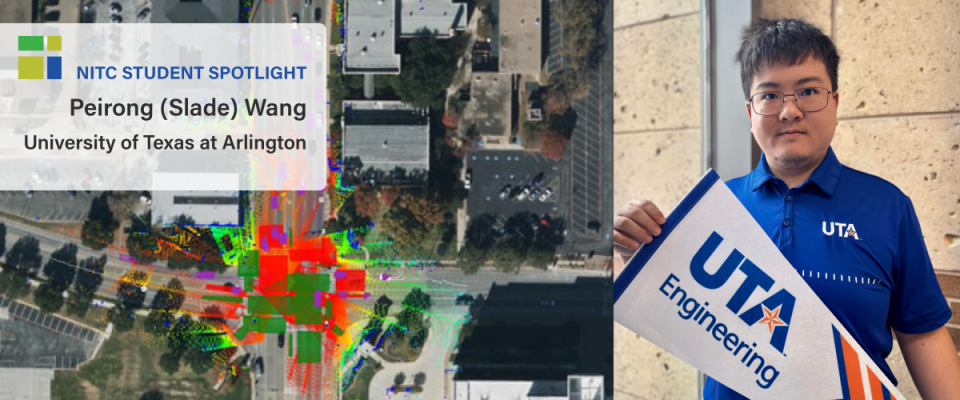Student Spotlight: Peirong (Slade) Wang, University of Texas at Arlington

Peirong (Slade) Wang is a PhD student in transportation engineering at the University of Texas at Arlington (UTA). He currently works as a graduate research assistant in UTA's ACTION (Advanced Computing in Transportation, Information, Operations and Networks) lab and serves as president of UTA's ITE student chapter. He earned a master's of science from Mississippi State University, where he also worked as a research assistant, and a bachelor's of science from China Agricultural University.
Tell us about yourself?
My name is Peirong (Slade) Wang, and I am currently pursuing my Ph.D. in transportation engineering at the University of Texas at Arlington. Prior to joining UTA, I obtained a bachelor’s degree in both Mechanical Engineering and Electrical Engineering and completed a master’s degree in Civil Engineering. At present, I am working as a graduate research assistant at the ACTION (Advanced Computing in Transportation, Information, Operations and Networks) lab, where I am engaged in cutting-edge research topics related to transportation. Additionally, I have the privilege of serving as the President of the Institute of Transportation Engineers (ITE) student chapter at UTA.
What (or who) has influenced your career path in transportation?
My father, who is a traffic professional, has been a great inspiration to me. As a child, he often took me along to work sites, where I had the opportunity to assist him with tasks such as traffic counting, distributing travel mode questionnaires, and collecting preference data from target communities. After earning my bachelor’s degree, I worked on a traffic signal optimization project. Specifically, I was involved in developing an adaptive signal control system for a local school district. Although the project succeeded in reducing the delay at the specific intersection, it also led to the formation of new congestion at nearby locations. It was then that I realized that traffic problems cannot be viewed in isolation and require a broader, network-level approach. This experience sparked my passion for transportation and the desire to find solutions to complex traffic problems that could enhance the overall transportation network. Thus, I decided to pursue a career in transportation engineering and am currently completing my Ph.D. in the field.
You've worked with Dr. Taylor Li on the NITC project "Pedestrian Behavior Study to Advance Pedestrian Safety in Smart Transportation Systems Using Innovative LIDAR Sensors.” Tell us about that work?
Last year, I worked with Dr. Li on this project that involved deploying an industry-level LIDAR sensor at two different intersections in the Dallas-Fort Worth (DFW) area. Both intersections experience high pedestrian volumes, but one intersection has voice-aided infrastructure to assist pedestrians in crossing while the other does not. The objective of this project was to collect precise pedestrian data using LIDAR sensors and, coupled with traffic signal states, analyze pedestrian behaviors such as perception-reaction time, waiting time, and crossing time at intersections.
The results of the project were very interesting. We found that the intersection with the voice-aided system had significantly lower perception-reaction time, and the LIDAR sensor accurately captured real-time pedestrian behavior and provided pedestrian volume data. Working on this project taught me a lot and inspired me to reflect on how, for decades, we have primarily focused on mobility for drivers while overlooking the safety of other road users at intersections. With new sensing technologies like LIDAR, I am excited to see future traffic designs that prioritize safety for all road users.
After graduation, what future work do you envision doing in transportation?
After graduation, my goal is to work as a professional traffic engineer and gain experience in the field of intelligent transportation systems. As someone with a background in Mechanical Engineering, I enjoy getting my hands dirty, I am eager to learn more about the latest sensing technologies, artificial intelligence algorithms and data-driven solutions. My goal is to use my skills and knowledge to contribute towards improving the transportation system. I am passionate about developing solutions that enhance safety and efficiency, and I am eager to make a positive impact on the industry. Ultimately, my aim is to help create a more sustainable and innovative transportation system that benefits everyone.
This is an installment in a series of monthly Student Spotlights we're shining on students and alumni that are involved with National Institute for Transportation & Communities (NITC) universities. NITC is a university transportation consortium funded by the U.S. DOT, and is a Portland State-led partnership with the University of Oregon, Oregon Institute of Technology, University of Utah, University of Arizona, and University of Texas at Arlington.
